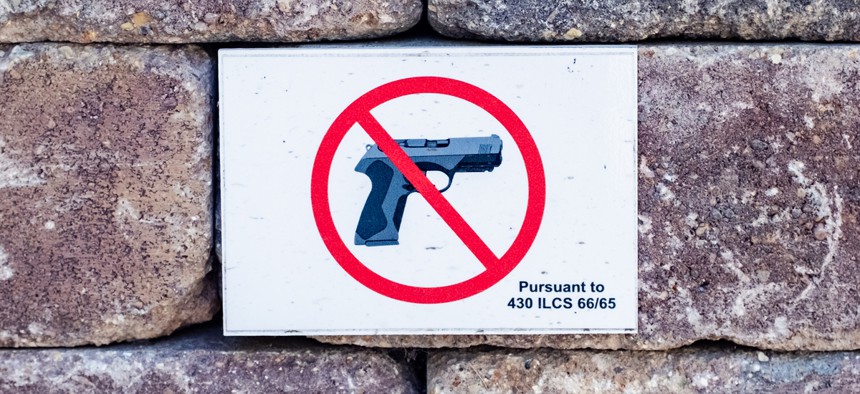Want to Regulate Guns? Target Gun Buyers, Not Specific Weapons, Research Suggests

Universal background checks were among the more effective type of gun laws, researchers found. Shutterstock
New research from the Rockefeller Institute suggests that banning specific types of weapons is a less effective means of gun control than restricting access for at-risk buyers.
Policies that control who can buy guns, rather than regulations than restrict access to certain types of guns, have the greatest impact on overall rates of firearm homicides, according to new research from the Rockefeller Institute for Government.
“It appears that laws which regulate the ‘what’ (i.e., what guns/products are allowed) do not have much of an impact on overall population homicide,” researchers from the Boston University School of Public Health wrote in the report, released Friday. “In contrast, laws that regulate the ‘who’ (i.e., who has legal access to firearms) may have an appreciable impact on firearm homicide, especially if access is restricted specifically to those people who are at the greatest risk of violence: namely, people who have a history of violence or are determined to represent an imminent threat of violence.”
To determine the most effective gun control policies, researchers examined the effect of 10 types of state firearm laws on suicide and homicide rates from 1991 through 2016 (compiled in a database here). Those policies included mandated concealed-carry permits, allowing concealed carry without a permit, banning firearm sales to people under the age of 21 and prohibiting people from purchasing a firearm, then reselling it to someone who can’t legally buy one.
After taking into account outside factors that are known to impact homicide rates (such as population density and poverty rates), researchers settled on three “priority pieces of legislation” they determined to have the greatest potential influence: universal background checks, laws that allow for the confiscation of firearms from people deemed a threat to themselves or others, and “prohibition of gun possession by people with a history of any violence misdemeanor, threatened violence, serious alcohol-related crime, or subject to a domestic violence restraining order.”
Since the mass shooting at Marjory Stoneman Douglas High School in Parkland, Florida last year, a number of states have moved forward with so-called "red-flag" laws, which allow family members or others to petition a judge for the removal of a gun from somebody who is a danger to themselves or others. Fourteen states and the District of Columbia have a version of these laws allowing "extreme risk protection orders," according to the Giffords Law Center.
Opponents, however, have raised due process questions with both these measures and other efforts to restrict guns from people convicted of misdemeanor domestic violence crimes. The research alludes to those objections, noting that "extreme risk protection order laws" that permit removal of firearms should be enacted only when "an individual who, after due process, is deemed to represent a threat to themselves or others."
The issue also has come up as Congress debates renewal of the Violence Against Women Act. The National Rifle Association has raised objections to provisions prohibiting people with misdemeanor stalking convictions from owning guns.
“The NRA opposes domestic violence and all violent crime, and spends millions of dollars teaching countless Americans how not to be a victim and how to safely use firearms for self-defense,” spokeswoman Jennifer Baker told National Journal. “It is a shame that some in the gun-control community treat the severity of domestic violence so trivially that they are willing to use it as a tool to advance a political agenda.”
The U.S. House of Representatives, now controlled by Democratic lawmakers, approved a bill in February mandating background checks at gun shows and other private sales, requiring sellers to screen for whether people are prohibited from owning a firearm because of a criminal record or other reason. The NRA also opposes that law, with Baker saying before the vote that criminals often buy guns on the black market.
According to the data, places with universal background checks were associated with 9.6 percent lower homicide rates, while places with laws banning guns from people convicted of violent misdemeanors were associated with 19.3 percent lower homicide rates. By contrast, researchers did not find any connection between homicide rates and assault weapons bans, large-capacity ammunition magazine bans, “stand your ground” laws or prohibitions on gun trafficking.
That's likely due to several reasons, researchers noted, including the difficulty of defining assault weapons. For example, many states will use the appearance of a firearm to classify it as an assault weapon, making it fairly easy to get around the law.
“In Massachusetts, a rifle with a folding stock is a banned assault rifle; however, if you drive a nail through the stock so that it is fixed, then it is no longer an assault rifle,” the report says.
Because of that, regulating access to weapons rather than regulating the weapons themselves seems to be more effective.
”Our findings are consistent with evidence that suggests a history of violence is strongly associated with an increase in risk for future violence,” researchers wrote. “Generally, these studies show that a history of a violent crime, an alcohol-related crime, or a threat of violence may all be sensitive and specific predictors of people for whom firearm possession puts the public at a heightened risk.”
The purpose of the research, the report notes, was not to identify which laws work or don’t, but to “compare the impact of multiple laws at the same time.” That resulted in a short list of types of laws “that appear to have the greatest impact and which should therefore be a priority for policymakers.”
Kate Elizabeth Queram is a Staff Correspondent for Route Fifty and is based in Washington, D.C.
NEXT STORY: Behind HUD’s Housing Discrimination Charges Against Facebook





